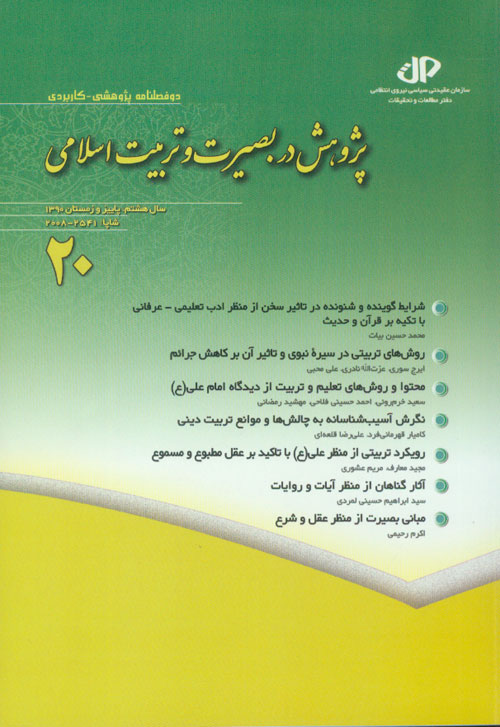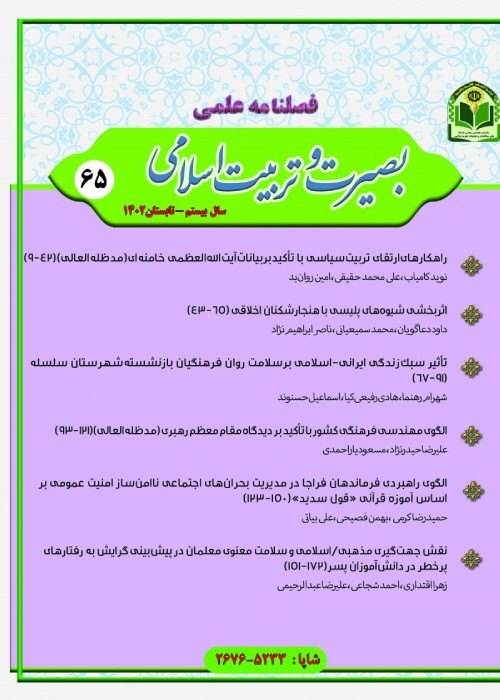فهرست مطالب

نشریه بصیرت و تربیت اسلامی
پیاپی 20 (پاییز و زمستان 1390)
- 158 صفحه،
- تاریخ انتشار: 1390/12/20
- تعداد عناوین: 9
-
-
صفحه 1
- مقالات
-
صفحه 3
در قرآن مجید و احادیث معصومان (ع)، توصیه های بسیار مفیدی برای گویندگان و شنوندگان وجود دارد و شرایط ویژه ای برای آنان ذکر شده است . با توجه به اینکه قرآن و سنت سرچشمه همه علوم اسلامی اعم از ادبیات، اخلاق، عرفان و... می باشد، ادبیات تعلیمی- عرفانی نیز که به حقیقت بیانگر مضامین بلند کتاب و سنت است با زبان دل نشین نظم و نثر فارسی آن محتوا را به جامعه بشری عرضه کرده است . نویسنده این مقاله کوشیده تا عوامل مهم تاثیر سخن گوینده بر شنونده را از نظر ادب تعلیمی – عرفانی با تکیه بر آیات قرآنی و احادیث خاندان نبوت (ع) ارایه دهد. این مقاله در چهار بند نوشته شده و هر یک از بندهای چهارگانه خود شامل چند بخش است . در این مقاله، برای اثبات مطلب، علاوه بر آیات و احادیث، تنها از سخنان سعدی، مولوی و حافظ استفاده شده است ، چه اینان در این زمینه گوی سبقت از دیگران ربوده اند.
کلیدواژگان: تاثیر، تاثر، گوینده، شنونده، ادب، اخلاق، عرفان، قرآن و حدیث -
صفحه 107
-
صفحه 137
-
چکیده انگلیسی مقالاتصفحه 149
-
Page 3
There are lots of very useful recommendations in the Holy Quran and sayings, which can be a good guideline for both announcers and listeners. With respect to the fact that the Holy Quran and tradition are the origin of all Islamic sciences including literature, morality, mysticism, …didactic-mystic literature is indeed expressing elevated themes of the Holy Quran and tradition, which has introduced the content through using dulcet Persian poetry and prose to the human community. The author of the present article has tried to introduce the important factors contributing to the influence of announcers’ words on listeners from didactic-mystic point of view, while stressing verses from the Holy Quran and sayings of the members of the holy prophet’s family(PBUH). The whole article is comprised of four parts, which themselves include several parts. In this article, in addition to referring to some verses from the Holy Quran and sayings, reference is made to works of Sa’di, Mowlavi and Hafiz, because they are pioneers of this field.
Keywords: Impact, influence, listener, announcer, courtesy, morality, mysticism, The Holy Quran, sayings -
Page 31In Iran’s Police forces organization, like any other organization, accuracy of the performance of the staff has significant impact on the way they provide services. In this regard, identifying the factors contributing to crimes reduction is pretty essential. Chief among the effective factors, which can contribute to crime reduction on the part of Police forces that can lead to displaying proper attitude and eliminating improper ones, is taking benefit from the Holy prophet’s teachings. Therefore,in the present research, seven principles out of the principles referred to in the Holy prophet’s teachings have been reviewed: glory, responsibility, inner development, continuity of action, improving conditions, order, discipline and stamina, and the impact of practicing them. The present research is of applied type and conducted through field research method in Zahedan Police Command in 2009.Having defined theoretical principles, a questionnaire comprised of 35 questions related to the seven hypotheses of the research developed and designed. After its reliability and validity approved, the questionnaire distributed among two groups of 75 individuals: criminals and ordinary persons. Finally, the achieved data analyzed through using SPSS, and the result indicated that training principles originated from the holy prophet’s teachings significantly contributes to crimes reduction.Keywords: Principles, method, training, prophet's teachings, crimes
-
Page 53The issue of teaching and training, as a social phenomenon, has always depended on the theories of the big scholars, philosophers and mystics.” Islam” is one of the reputable training schools in the current age, and its content is crystallized in sayings and deeds of its leaders such as Imam Ali. On this basis, the researcher tries to review training methods from Imam Ali’s point of view. The present research aims at reviewing Imam Ali’s point of view and its impact on methods and content of Islamic teaching and training. For this purpose, two elements: training and teaching methods and content have been reviewed. The most important findings of the research are: reward method, punishment method, moderation method in punishment and accusation, annunciation, warning, affection, negligence, getting accustomed to good deeds, minding, association with scientists, visualized method, and advice method. The content of training and teaching with respect to Imam Ali’s point of view is: Quran training,”Halal “and forbidden training, content of pious persons’ day and night plan, and reflection raising content.Keywords: Training, teaching, method, content, Imam Ali
-
Page 73Nowadays, performance of family and other training and cultural organs in desirable and effective training of children, proportionate with indigenous norms and religious doctrines have been seriously challenged in a way that technological, communication and information revolutions, while speeding up development of advanced communicative technologies and expanding public access to them, has led to globalization in their various aspects. Despite their potential opportunities and capacities, they have materialized the dream of global village, while leading to challenging threats and competition for the training patterns, especially for religious training in families and schools. In the current network community, teenagers and young people have quick and easy access to variety of communicative technologies and because of this, identity and training related problems get more visible in the form of some new phenomena such as value strife, ignoring traditions, ignoring religion, superstition, self-indulgence, consumerism, etc. Therefore, while paying attention to this basic warning, the question here is:” How can we manage and guide the responsibilities and performance of cultural and training organs in line with a desirable religious process through adopting a moderate approach?”The present article while identifying the mischief analyses the challenges and pays attention to offering an effective religious pattern and ways of reinforcing it.Keywords: Religious teaching, training, globalization, mischief, challenges, effective, desirable pattern
-
Page 93According to Imam Ali’s viewpoint, existence of innate intellect or desirable intellect in the process of teaching and training is among the requirements of cognition and learning, and, formation of human deeds, teaching and training without theses two would not be possible. Paying attention to discrepancy among persons due to having different natures, and existence of innate intellect among them has made individual training inevitable in all training periods and processes in line with securing students’ values and individuality. On this basis, achieving and training acceptable intellect or acquired intellect among human beings would be possible in various forms such as experience, knowledge, etc. Therefore, based on Imam Ali’s viewpoint, the type of training in which students are either classified individually or in homogeneous groups and provides the opportunity to get experience and think about various subjects, is among the most effective training approaches. The author of the present article has reviewed the importance of intellect in training and teaching in a descriptive - analytical approach based on Imam Ali’s remarks.Keywords: Imam Ali, desirable intellect, acceptable intellect, training oriented approach
-
Page 107Lord who has considered human being His best and most superior creature, has put everything in the sky and on land under his control, and has announced mankind His representative,so mankind should not commit sins and disobey Him. With respect to the rule of cause and effect, committing sin and disobeying the Lord leads to evil consequences. The present research, while defining sin and classifying it into two groups-small sins and great sins- reviews the criteria for distinguishing small ones from the great ones through referring to verses from the Holy Quran and sayings in various fields including mental impacts of decay and cruelty, weakening conceptual and rational power, individual and social impacts, secular and eternity impacts, and especial impacts of every type of sin. Afterwards, some practical recommendations have been offered for preventing from committing sins.Keywords: Sin, great sins, small sins, cruelty, verses, sayings
-
Page 137“Vision” is one of the fundamental vocabularies in Islamic literature. The word is of high importance in Quran teachings and Imam Ali’s works, as well. For this reason, the present research tries to quickly review the fundamentals of “vision” from intellect and canonical point of view. Hence, the research has had a realistic approach to express “vision” from two viewpoints- semantic and value cognition dimensions-and has dealt with the infrastructure of “vision” in Quran’s verses and Imam Ali’s sayings. Therefore, in order to reach truth, one should go through it with cognizance and vision and in addition, one should take benefit from religious teachings to get closer to the Lord.Keywords: Vision, semantic, value cognition, self alienation, will


